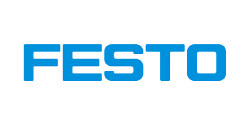The fast route to a safe insulin pen
Diabetes is on the rise worldwide with around ten million people developing the disease every year. Demand for insulin pens allowing patients to self-medicate is similarly high. Syntegon’s Danish subsidiary has developed an automated system to assemble the pens using the Festo automation platform.
'I have a dream,' says Michael Andersen, Sales Director at Syntegon Technology Sandved in Denmark. 'I dream of on-the-fly format changeovers in our machines. That would be the crowning moment of our philosophy of flexibility and agility that guides our business,' adds the automation expert.
Flexibility and agility
'By using the Festo automation platform, including the servo press kit, we are very close to making this dream come true,' says Andersen. And the servo press kit YJKP from Festo – a preconfigured modular system consisting of software, controller and electric standard drives – does indeed offer easy system integration and a large degree of flexibility thanks to the preconfigured software. The modular press system with servo drive for electric press-fitting and joining up to 17 kN is immediately ready for use. Compared to similar solutions on the market, it is intuitive to configure and cost-effective.
'We have installed over a hundred servo press kits on the automated assembly lines for insulin pens,' says Ulrik Keldke, head of the engineering department at Syntegon in Sandved. The precisely adjustable press-fitting and joining forces ensure consistent quality and low reject rates. 'What we really like about the servo press kit from Festo is that it’s quick and easy to put into operation and no training is required for machine operators,' explains Keldke.
Quality and safety
'The assembly line needs to be automated to meet the requirements for the end product: the insulin pens have to be safe and user-friendly for people to self-medicate,' says Andersen. Ultimately, the pens must not break when used by patients and thus put them at risk. The servo press kit keeps the tension and pressure constant. 'For example, irregular pressure should never make the syringe glass break,' says Keldke. The automated systems ensure the insulin pens are always in good order and can supply the patient with the right amount of insulin.
Depending on the type of machine, Syntegon’s assembly machines can produce up to 300 pens per minute. The degree of automation can be scaled in line with requirements and can also be adjusted at a later date. The machine designs are based either on a rotary table for low to medium capacities or a linear transport system for high capacities. Additional supply lines and stations can be added to the system to increase capacity and the degree of automation.
The servo press kit YJKP from Festo performs three joining and press-fitting steps: from inserting the cartridge, needle and spring to inserting the glass and plastic covers.
Durability and reliability
Syntegon Technology, formerly Bosch Packaging Technology, views itself as a supplier of integrated solutions: the assembly line for insulin pens can be expanded to a full line with other coordinated systems from the company. Pharmaceutical manufacturers can obtain the process functions of filling, sealing, assembling, inspecting, labelling and packaging preconfigured from a single source.
The machine control system is based on electric and pneumatic components and modules from the Festo automation platform, thus ensuring consistency on the supply side: Festo’s products are available worldwide and offer open interfaces to higher-level control systems. The connection to the process control level is provided by the module CPX-E-CEC from Festo. This opens it up for PROFINET or, for other customers in Europe, EtherCAT®. However, the system could also be supplied with the EtherNet/IP module specifically for North American customers.
Standardisation on the component side has other benefits that give Syntegon the competitive edge: a faster time to market. 'This is a growing trend in the pharmaceutical industry,' explains Syntegon’s Michael Andersen. 'We are currently able to deliver systems in six to nine months. However, we aim to get this down to three to six months. With our flexible and agile approach, we’re moving a step closer to this goal every single day.'
About Syntegon:
Syntegon Technology is a world-leading supplier of process and packaging technology. As a former packaging division of the Bosch Group, the company, with its headquarters in Waiblingen, Germany, has been offering complete solutions for the pharmaceutical and food industries for more than 50 years. In 2019, more than 6,100 employees in 30 locations in over 15 countries generated an overall turnover of 1.3 billion euros. The company’s portfolio of smart and sustainable technologies includes individual machines as well as complete systems and services. They are used in the pharmaceutical industry in the areas of manufacturing, processing, filling, inspection and packaging of liquid and solid medication (e.g. syringes and capsules). The company’s portfolio for the food industry includes process technology for confectionery and packaging solutions for dry foods (e.g. bars, baked goods and coffee), frozen foods and dairy products.
